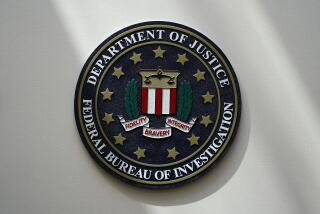U.S. Indicts Four Tied to Terrorist Abu Nidal Group
WASHINGTON — In a major crackdown on a Palestinian terrorist organization in the United States, four reputed members have been indicted on racketeering charges that include the killing of a teen-age daughter of one of them to silence her, conspiring to murder Jews and discussing the possibility of blowing up the Israeli Embassy here.
The indictment, unsealed Thursday by a federal grand jury in St. Louis, marked the first legal action against the shadowy Abu Nidal organization here. It is known as the Fatah Revolutionary Council in the Middle East and is headed there by terrorist Abu Nidal.
Although the organization is reputed to be among the most extreme groups supporting the Palestinian cause, there are no apparent links to the New York World Trade Center bombing, FBI officials said.
The indictment sheds new light on alleged activities of the U.S. cell of an organization best known for terrorist activities overseas. A State Department report blamed the Abu Nidal group for more than 90 terrorist attacks since 1970 in 20 countries that killed or injured nearly 900 persons. During the Persian Gulf War, the FBI rated it as having “the highest potential” for terrorism in the United States.
Operating a racketeering “enterprise” here since at least 1986, the Abu Nidal organization’s purposes included smuggling money to other members around the world in violation of currency reporting requirements, helping develop terrorism and murder plans, targeting Jews as victims and obtaining both light and heavy weapons, according to the indictment.
Bruce Hoffman, a terrorism expert for RAND, a Santa Monica think tank, hailed the legal action by the grand jury for recognizing that “there is a far more extensive Middle East terrorist network” in the United States than generally acknowledged. “It shows that things we dismiss as isolated crimes” can turn out to be elements of terrorist operations, he said.
The four defendants charged in the indictment are Zein Isa, Saif Nijmeh and Luie Nijmeh, all of St. Louis, and Tawfiq Musa of Milwaukee. All are American citizens.
To further their terrorist plans, the indictment charges, Isa and the two Nijmehs met in Mexico City in April, 1987, with Mahmoud Atta, allegedly the North American coordinator for Abu Nidal, who gave them instructions for carrying out terrorist attacks.
According to the indictment, which FBI officials acknowledged relied heavily on evidence gathered by electronic surveillance, Musa directed Isa on May 8, 1987, to destroy any records he received during his Mexico City meeting because Atta had been arrested in connection with an Israeli killing and could be linked to them.
Atta was deported to the United States and eventually extradited to Israel, where he is serving a life sentence for machine-gunning an Israeli bus, murdering the driver and wounding two passengers.
Although officials at FBI headquarters said that they knew of no connection between the Abu Nidal case and the World Trade Center bombing, a man who has been linked to the suspects arrested in that case may provide one. El Sayyid A. Nosair, who was convicted on weapons charges stemming from the murder of New York radical Rabbi Meir Kahane, was said to have become a martyr for some radical Arabs, including several of the men charged in the trade center bombing who demonstrated against his sentence and visited him in prison.
When FBI agents searched Nosair’s Cliffside, N.J., apartment in 1990, they discovered a list of Americans who had played roles in Atta’s extradition to Israel. At the time, U.S. authorities, fearing it was an Abu Nidal hit list, offered FBI protection to those on the list, which included two federal judges, a New York City congressman and a former assistant U.S. attorney.
The indictment unsealed Thursday also charged that on Oct. 31, 1987, Saif Nijmeh discussed with an unnamed co-conspirator a plan to kill a suspected informant who could provide authorities with information about the group’s criminal activities.
On Jan. 11, 1988, Luie Nijmeh discussed with an unidentified co-conspirator blowing up the Israeli Embassy in Washington, the indictment alleged, presumably reflecting a monitored conversation.
In detailing Isa’s 1989 murder of his 16-year-old daughter, Palestina (Tina), the indictment raised a motive other than the clash of cultures over the girl’s desire to act like an American teen-ager--the motive alleged at Isa’s state trial and conviction, for which he has been sentenced to death.
The indictment alleged that on Oct. 16, 1989--three weeks before the girl’s murder--Saif Nijmeh and Musa met and Nijmeh “advised that Tina Isa be killed.”
This reflected “concern over her knowledge of their terrorist activities,” an FBI official said.
At the 1991 murder trial of Isa and his wife, Maria, jurors heard a chilling recording of the father stabbing his daughter to death as she allegedly was held down by her mother and pleaded for her parents to stop.
Times staff writers John J. Goldman and William C. Rempel in New York contributed to this story.
More to Read
Sign up for Essential California
The most important California stories and recommendations in your inbox every morning.
You may occasionally receive promotional content from the Los Angeles Times.










